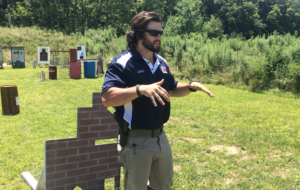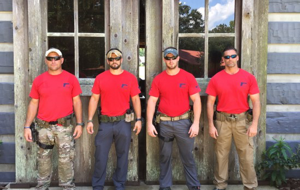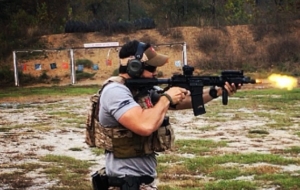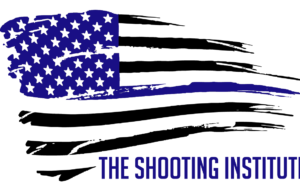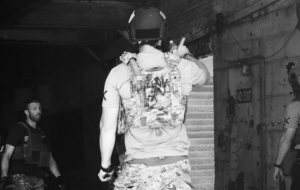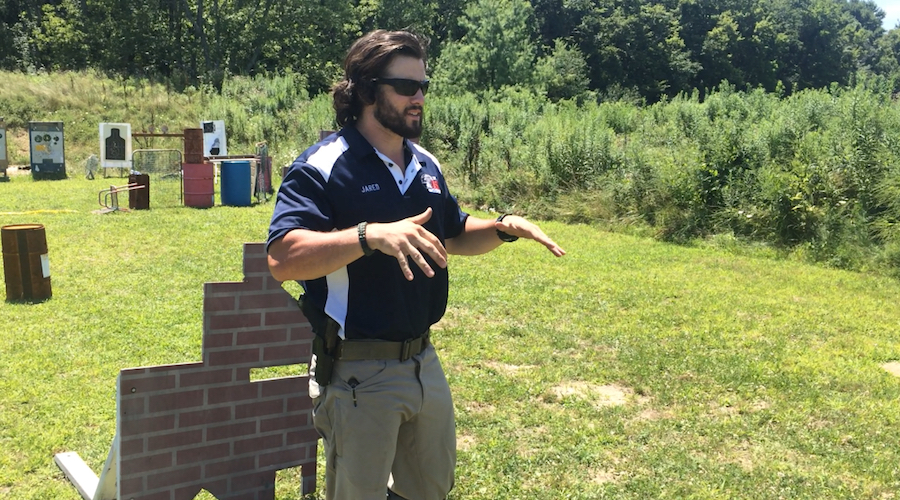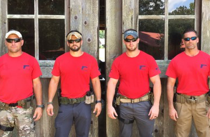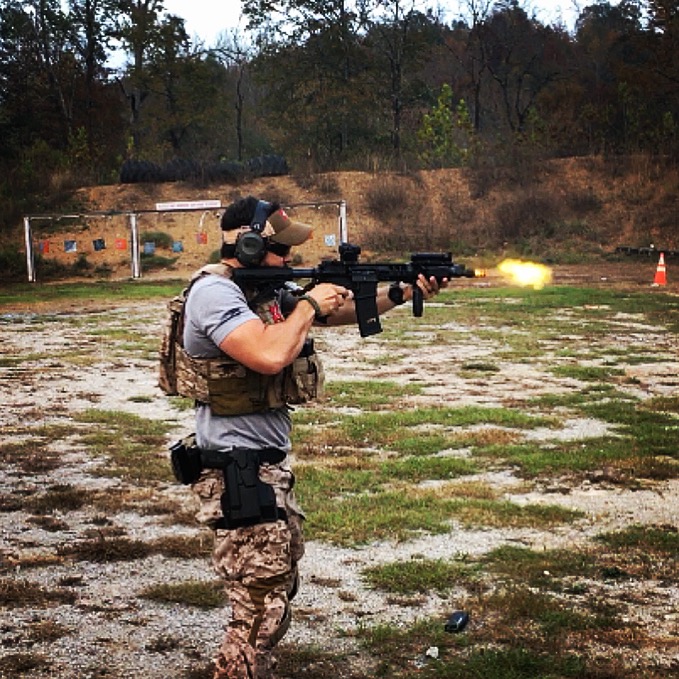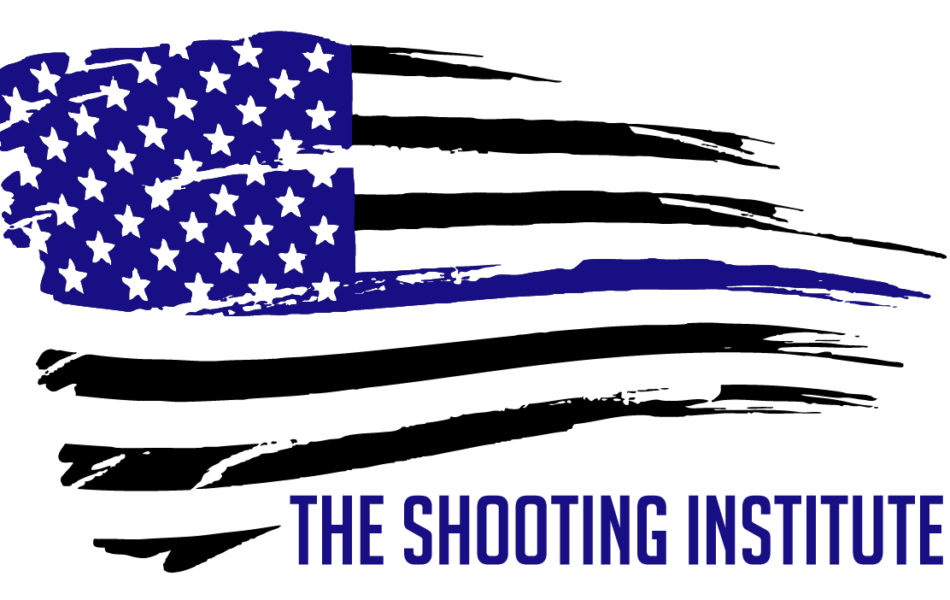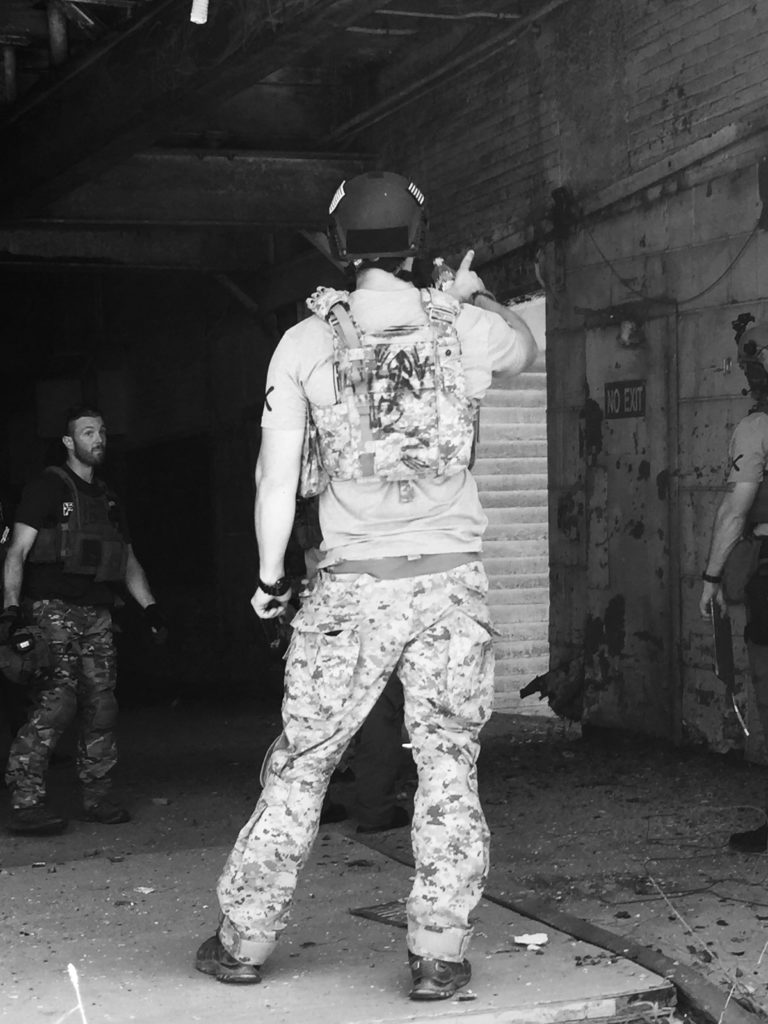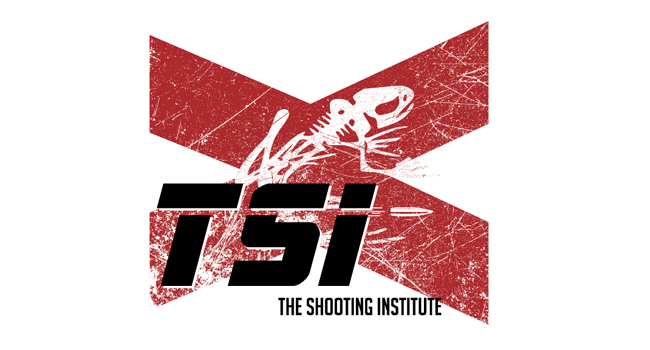
About THE SHOOTING INSTITUTE
The Shooting Institute has been providing quality firearms training, tactics, and marksmanship techniques since 2012. Battle-proven training and the very best instructors – former special operations, law enforcement, and NRA instructors – provide basic explosive, breaching, and sniper training to local and federal law enforcement agencies throughout the country. TSI is also the preferred SWAT and tactical teams training organization for numerous high-profile SWAT organizations.

ABOUT JARED HUDSON
Please describe your service to our country (years in service, rank, deployments, etc): I was a Seal for 6 years in Seal Team 3. I was in about 7 years total, the last 8 years, went through some medical stuff. Went in in 2006 and got out 2013 and then that last year, 2013-14, I was in the inactive reserves going through a lot of medical stuff. I actually got diagnosed with Type 1 Diabetes from the Anthrax vaccine, so that would be the main reason that I’m out of service because you cannot be an insulin dependent diabetic and still be a SEAL. God does everything for a reason, so I’m perfectly fine with it.
So when I was in the SEAL Teams, I was actually lead sniper at Team 3 from 2010 to 2013, basically. I was a sniper, I did deployments – multiple deployments in support of OEF and OIF, everything supporting either Iraq or Afghanistan during the time. We helped shut down Iraq in 2011. We were supposed to be in Iraq in 2011 but then it got shut down. But everything I did was to support OEF, OIF, which is Operation Enduring Freedom, Operation Iraqi Freedom, and then a thing called GWOT, the Global War on Terror. Multiple combat deployments in support of those missions. Then when I got out, obviously going through some medical stuff for a while, I did contract work for a little while for a couple different companies, anti-piracy stuff, went overseas but with the medical stuff, it actually became relatively difficult deploying. So by doctors’ orders, I stayed home.
At that point in time, I went to the local civil service desk and got hired by Shelby County Sheriff’s Office and went to the Academy and became a Sheriff’s Deputy. So I was a Sheriff’s Deputy full time for 1 year. I did not care for it. It was a lot of things that I disagreed with, so I left at the end of my first year and started this company. Now, I started this company actually when I got out for the purposes of contracting. I kind of taught pistol and courses in between, but when I left the Sheriff’s Office, I kind of went full tilt into running my company and did contract work. So I ran the company and did contracts, deploying out and being gone until about 2016. 2016 is the first year I started doing my company, The Shooting Institute, full time.
Since then, we’ve been training Law Enforcement and been training SWAT Teams. I kept the badge as a reserve at the Sheriff’s Office so I could keep my Law Enforcement credentials. Then we go around the nation and train warrant service teams, investigation – guys that serve a lot of warrants like vice or narcotics, or drug investigators or anybody who might be clearing a room, any kind of tactical unit, so not just SWAT but any tactical unit. We do a lot of training for those and it has bled over into training for regular Law Enforcement Officers, civilians, obviously, and now we’ve been some into church/corporate entity, we train with those guys as well.
It’s really started taking off in 2016, 2017. It really took off this year and then obviously rolling into 2018. We just bought 50 acres near where I live in Chelsea, AL to develop a gun club/training facility so we have a home base. We still travel nationwide and then obviously, we’ll utilize our own facility for our training from home.
Please describe what the SOF brotherhood means to you: It’s been the vast majority of my adult life, so from 19 to 27, that’s what I was either going to be or I was in – the Special Operations community – in particular the SEAL community. When I left at age 27, I was still tied to the SEAL community really well, and I still am to this day – still have buddies in there and everything – and now on the training end, whether it be the DoD or Law Enforcement, still Special Operations on the Law Enforcement side, it’s almost like a second family. It’s what I’ve done for the duration of my adult life, so it’s a second family. It’s obviously not your kids or your wife, those are different things and you can’t compare those, but it’s similar, I guess.
How has the transition from warfighter to civilian gone? It’s actually relatively difficult to be honest with you. I would prefer to be at war. I mean, that’s why I joined, was to go fight war, kill bad guys, and I would prefer to do that. So, when you’re in Afghanistan, for example: Afghanistan is like the Wild West, at least when I was there it was, and you go out, you kill bad guys, you go work out, you get something to eat or whatever, and it was stress free. You could go to war and then you could come home, work out, and rest and then you go to war the next day and that was very enjoyable, versus, you know, here, it’s like – telephone payment, mortgage, loan, you know, whatever it is, you know – life. Hey, I got a doctor’s appointment, Christmas, everything is just a lot more stressful. So, I think it’s a hard transition because war is easier in my opinion than life that you have here, so the transition is very difficult.
Think of it this way: in a war zone, you have ultimate freedom – big boy rules across the board. Here, you don’t. Here, you know, stateside – normal, everyday life – you don’t have freedom. You’re enslaved to the society we live in and having to fit within that society and having to pay for those things that that society says or requires you to have. It’s definitely a lot easier to have your life in danger than to have to deal with, like, insurance or something like that. That’s just my opinion.
You’ve got to think of it this way, and I know everybody doesn’t approach it this way, but for me, I mean, yeah, your life’s in danger but if you’re a believer and you believe in Christ, well, if I die, I win. If I don’t die, so be it, you know – I’m still here. I do trust that when things are out of my control, they’re obviously in God’s hands.
I tell guys, I say, “Hey, it’s in God’s hands now,” and I say that a lot to guys and they laugh and joke about it and [my teammate] laughs and says, “Nah, but what you don’t understand is that’s how this cat really lives his life.” Not just with “hey, we might get blown up,” but literally with everything – with the company, with everything. I know that to be the case. So whether it’s your life at risk or your finances at risk, or your health or whatever it is, it doesn’t matter. I find it easier to deal with your life at risk than having to deal with the stress of all this other stuff. But ultimately, no matter what it is, the transition shouldn’t be hard from one to another if we truly trust God, so I guess that should be the real answer. But I’ve found it difficult and I continue to find it difficult transitioning from SEAL Teams/war zone back to stateside/be a normal person life. I find it difficult.
What is the name of the business you started? The Shooting Institute
When did you start it? 2013
Where is it located? Birmingham, AL
What does this company mean to you/why is it important? My dad is a Southern Baptist preacher, and he doesn’t have a platform to talk to a lot of the guys that I have the platform to talk to, so it allows me the ability or gives me the platform to talk to people who might not darken the doorway of a church. So one, I’m potentially able to share Christ, share my beliefs in a way that others in the clergy ranks are not able to. Again, that is the primary goal.
The secondary goal is – there’s so much bad training out there or misunderstood training, in particular for Law Enforcement, and the only reason I’ve learned that is I’ve been in law enforcement now for a handful of years and I’ve worked with a lot of cops and those guys are actually in more dangerous positions oftentimes than we ever were overseas. And look at the world you go into now, where it’s like holy cow, is the agency even going to back me in this situation because I did this or if I do this? So you start seeing the reasoning behind that and the reason behind that is these guys don’t have the confidence in the training that they’ve actually had or there’s people who are hired that don’t have the mindset that even need to be in that position.
And that’s where we come in and we can show people, hey, look, number one, Simplify the Chaos (that’s our little saying that we like to use). So we simplify things and show them this is the truth, this is reality, this is truth, this is how it really needs to be put out. All this other stuff is tertiary and that helps guys, I guess, wade through the bullcrap of oftentimes what’s put out in Law Enforcement training. Like when I went to the Academy, it drove me crazy. You got guys putting out how to survive in a gunfight but they’ve never been in a gunfight, and I’m like, “I’ve been in a lot of gunfights, y’all, and what you’re putting out doesn’t work.”
Sharing Christ, first and foremost as a Christian, that’s just mine since I own the business. I’m able to push that as the number one goal of the business. And everybody within my business that I’m either partnered with or works for me – I wouldn’t say everybody within my business actually knows Christ – but it is a way for me to share Christ with them and I can do that owning the business, so that’s number one. Number two, providing quality training and being able to provide needed training to guys who don’t normally or wouldn’t normally get it.
What have been some challenges as an entrepreneur? I would say the first part, keeping or trying to keep Christ primary because there’s so many guys that you have to have to help you along the way that don’t want you to do that. Second part, being fair in your business dealings because oftentimes fairness within business is weakness and isn’t a good business decision, but it doesn’t necessarily mean it’s the right decision. So that’s probably the hardest thing for me is making the right decision even if it’s not fair for the business or making the morally right decision even if it’s not fair for the business or fair for me or fair for somebody else even. It doesn’t necessarily have to be me or the business or my guy, there might be another business. Making the morally right decision even though it doesn’t make sense, that is very difficult being an entrepreneur. And I would say I truly believe that when it comes to those decisions, no matter what makes sense on the earthly side where we’re at now, I really believe God honors the morally right choice over the seemingly correct decision.
What is the best part of being an entrepreneur? Being able to call your own shots, I would say that’s definitely it, or at least within reason, you know. You don’t really have to answer to the man. That is definitely a plus.
How did your SOF career prepare you for what you are doing now? (In what ways have you drawn on your experiences as a SOF soldier in your business life?) Well, I would say, somebody once told me, “Yeah, doing all that training made you who you are.” No, I don’t believe that. I believe everything you do to become a SEAL just finds a certain select few guys who already have a specific mindset and heart and makeup inside of them, you know.
David said in Psalms that you are knit in your mother’s womb. God knew you long before you were born and it talks about how He made us made intentionally and I really believe that to be the case. So as far as training, I believe I was always this person but what that training and what my Special Operations background and not just training, but deployments, combat brought out in me was what God had already made me to be and that was just used to hone or separate the dross, I suppose (if you want to use what the Bible uses when you’re melting silver or whatever, and it’s got the dross) clean it off the top and you have pure silver or gold or whatever. If you want to separate the stuff you don’t need – I would say that’s what I pull on. I pull on not what training or combat or being a SEAL or anything has created, it has just made me sharper and more precise with how God already made me.
And I believe that across the board with most people within this community. I don’t believe it’s done anything for them or gives them anything extra to draw on, it just makes them more precise, they know where to draw. I believe that the Lord uses that turmoil, that stress, that whatever during training because I’ll be honest with you, in all honesty, the hardest thing about deployments was being gone from family and friends – from my wife, she is really ultimately the reason I stopped doing contracts altogether and started doing this full time. I really don’t even like using combat and all that because I don’t even look at it as a honing thing. That was easy, that was the fun part, that’s game time and it’s kind of like, devastated that I don’t get to do that every day. But the training and all that stuff, the hard part was that it’s just pulling out, you’re pulling out what is already in and the guys that don’t make it didn’t have it to begin with, so you’re pulling out something that God has already knit inside you. And for me, once that was pulled out, it has allowed me to see or helped me to see where I need to draw from to do specific things.
So as an entrepreneur, obviously it takes a good bit of tenacity, a willingness to not sleep, to work late hours, to get up early when everybody else is still sleeping, to be willing to do what no one else is willing to do – to basically have, for lack of a better word, an iron will and if you’ve never experienced that before, obviously being an entrepreneur can become relatively difficult because you don’t know where do I draw this iron will from? Well, me, I’ve already found out where to draw that iron will from and I can just draw it from the same area and put it in place.
What do you offer the consumer not only through your business, but also through your expertise as a SOF Veteran? If you want to know how to shoot or if you want to know how to defend yourself as far as Close Quarters Combat, I can teach you how to do that. I can teach you how to kill bad guys or I can teach you how to shoot faster if you want to shoot matches and that’s pretty easy.
Who has influenced you as an entrepreneur? I’ll be honest with you – as cliche and cheesy as this sounds – just God, my relationship with Christ. I mean, Christ, in a short 33 years, turned the world upside down. Everybody across the world for the most part knows about Christmas, celebrates Christmas all because Jesus was born. Most people know about Easter. Christ is easily one of the greatest figures of all time. I don’t think it’s too hard to note that. Whether it’s disputed or not, look at what he did in a relatively short amount of time, being crucified, so I look at that – just entrepreneur, my regular life – I rely solely on his strength and power so I would say Christ. I would say Jesus Christ.
If I’m looking at a businessman, to be honest with you, I’m really impressed with Donald Trump, as much as people probably don’t like hearing that nowadays. I’m impressed to see Donald Trump as a businessman. Look at his family – his kids love him, they rally around him, and yet he’s still grown a pretty big business, regardless of what anybody says. Take his presidency away and all that stuff, you know, (personally I like him as a president, but that’s irrelevant), I’m just saying just him as a businessman, what he’s accomplished has been impressive. So I would say him as a man but really, Jesus Christ. But if I was to look at a businessman, then Donald Trump.
Family? I love my family and I love kids, we’ll just leave it at that.
Why do you live where you live? Because it’s where my family’s from. I’m a big family guy. And you can’t beat the great state of Alabama.
Favorite food? Eggs and bacon
Favorite place in the world? State of Alabama
Favorite movie? “Outlaw Josie Wales”
Favorite book/books? Short of the Bible (in particular the book of Proverbs in the Bible), “Gates of Fire” about the 300 at Thermopoli, “Count of Monte Christo” by Alexander Dumas
Pets? 25 pound white poodle
What do you like to do in your spare time? Spend with family, hunt, fish
Words you live by (ethos)? “If we’re in line with God, this thing is going to go; if we’re not, then it ain’t. It’s in God’s hands.”
